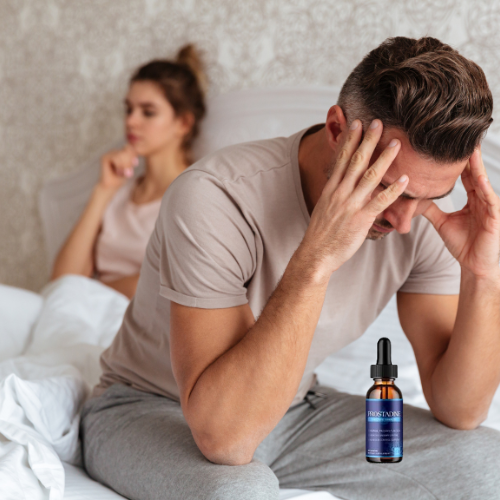
The prostate is a walnut-sized gland located below the bladder and in front of the rectum, and plays a key role in men’s health. Its main function is to produce a fluid that makes up ejaculate, helping to nourish and transport sperm. In addition, the prostate contributes to hormonal regulation and sexual function, making its health essential to men’s quality of life. Neglected prostate health can lead to conditions such as benign prostatic hyperplasia (BPH) and prostate cancer, which pose significant health risks.
Benign prostatic hyperplasia, a common condition in older men, causes the gland to enlarge, leading to urinary problems such as difficulty urinating, increased urinary frequency and, in some cases, urinary tract infections. This condition, although not cancerous, can seriously impact quality of life, often requiring medical intervention. Prostate cancer is another major concern, as it becomes more prevalent with advancing age. Studies indicate that one in nine men will be diagnosed with this type of cancer during their lifetime.
Risk factors associated with prostate problems include family history, advanced age, and diet and lifestyle issues. Therefore, experts recommend regular checkups and screening tests, especially for men over 50 or those with a family history of cancer. Early detection is crucial, as it can increase the chances of effective treatment and recovery. Therefore, attention to prostate health should not be underestimated, and incorporating healthy habits and regular medical visits can contribute significantly to men’s overall health.
Prostate Health Care and Prevention
Prostate health is a significant concern for men, especially as they age. Adopting a healthy lifestyle and self-care practices can help keep the prostate in good condition and prevent potential problems. A balanced diet is essential, and nutrient-rich foods can benefit prostate health. Fruits and vegetables, especially those rich in antioxidants, such as tomatoes, broccoli, and berries, should be incorporated into the daily diet. Lycopene, found in tomatoes, has been linked to a lower incidence of prostate disease.
Click on the link below and discover this incredible product

In addition to diet, regular exercise plays a vital role in prostate health. Not only does physical activity help maintain a healthy weight, it also helps reduce the risk of chronic diseases, which can negatively impact prostate health. Aerobic exercise, such as walking, running, and swimming, is recommended, as are activities that promote strength and flexibility.
Click on the link below and discover this incredible product
Stress management is another important aspect to consider. High levels of stress can negatively affect overall health, including prostate health. Stress management techniques, such as meditation, yoga, and deep breathing, can be beneficial. In addition, getting enough quality sleep is crucial, as sleep deprivation can impair the immune system, increasing susceptibility to disease.
Seeing a doctor regularly for routine checkups is essential. Medical checkups allow for early detection of any problems, including prostate cancer. Men with a family history of prostate disease should be particularly diligent in scheduling appointments and discussing their concerns with a health care professional. In short, a combination of a nutritious diet, exercise, stress management, and medical monitoring can help men ensure prostate health and, ultimately, their quality of life.
Libido and Male Sexual Health
Libido, or sexual desire, is a fundamental aspect of male sexual health, as it not only influences the pursuit of intimate relationships, but also affects self-esteem and the dynamics of interpersonal relationships. Prostate health plays a significant role in this context, as conditions such as prostatitis, benign prostatic hyperplasia (BPH), and prostate cancer can directly influence libido. When prostate health is compromised, many men report a decrease in sexual desire, which can be attributed to both physical and emotional factors.
In addition to prostate health issues, other physical issues, such as hormonal disorders, can impact libido. For example, decreased levels of testosterone, a hormone crucial to maintaining sexual desire, can result in a significant reduction in male libido. Factors such as obesity, a sedentary lifestyle, and chronic diseases also contribute to changes in sexual desire, reflecting the interconnection between overall health and sexual health.
Prostadin’s Effective Approach to Prostate Health
Prostadin, a remarkable prostate health formula, was meticulously developed based on the latest clinical trial conducted by Harvard scientists. Their research highlights the troubling issue of poor and aging water pipe infrastructure in the United States, leading to the consumption of water containing toxic minerals. Over time, these toxins build up in the body, resulting in various health issues, including prostate health issues.
Removing Toxins and Supporting Prostate Health:
Prostadine works diligently to eliminate toxins from the body and promote a healthy urinary system. This powerful formula comprises a carefully selected blend of natural ingredients that have been extensively clinically tested to demonstrate their effectiveness in supporting prostate health. Key ingredients include Saw Palmetto, Wakame Extract, and Pomegranate Extract, all of which have been proven to produce significant benefits for the prostate, reducing inflammation and improving overall functionality.
Other potential health benefits of taking Prostadin include:
Improved cardiovascular health
Regulated thyroid
Lower blood pressure
Promoted kidney function
Improved sexual function
Improved male reproductive health
Click on the link below and discover this incredible product